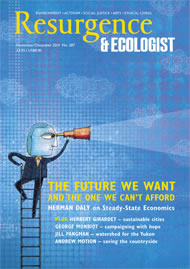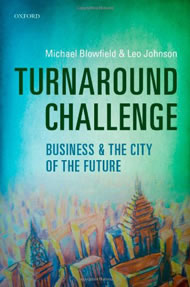It’s certainly possible to have too much of a good thing. A few weeks before opening Turnaround Challenge, I had finished a commission for a leading international business magazine that involved scanning well over twenty of the latest business books, reading thirteen of them, and then reviewing three, before picking an overall winner. Great books, to be sure, but I emerged punch-drunk.
Still, when Resurgence & Ecologist invited me to review Michael Blowfield and Leo Johnson’s book, I said yes. Why? Well – interest declared – I know Boris’s sibling Leo glancingly through an advisory board we are both members of, and I thought the book might be both interesting and fun.
First impressions suggested otherwise. The cover shows what looks like a Beijing skyscraperscape viewed through the bottom of a dirty aquarium. The book’s interior design struck me as a bit academic. And, boy, do Blowfield and Johnson love their acronyms! SLEPT, to take just one, stands for ‘social, legal, economic, political, and technological’.
You are left in no doubt that the authors are up to their eyeballs in the blurring worlds of sustainability and business. Blowfield is an academic at several universities, and is a former manager and consultant for public- and private-sector clients in more than twenty emerging economies. Johnson worked for the International Finance Corporation before becoming a founder of Sustainable Finance (later acquired by PricewaterhouseCoopers) and presenter of the BBC World News show Down to Business.
None of that had prepared me for the depth of insight this book provides – although this comes as less of a surprise when you read that it evolved out of a series of lectures the authors gave at Oxford University’s Smith School of Enterprise and the Environment and to Sloan Fellows at London Business School.
At the book’s heart are three very different visions of tomorrow’s cities. The first is Petropolis, locked into 20th-century technologies of fossil-fuel-driven mass production, and featuring rising inequality, credit-fuelled consumption, offshored jobs, climate volatility, and unsustainable household and national debt. In this future, Resurgence & Ecologist might be used by a niche audience as a form of social science fiction.
The second city vision is Cyburbia, which the cover blurb describes as a world of voice-activated popcorn dispensers, athletics shoes with built-in Twitter feeds, and sensor-packed, censoring glass towers that “risk reducing their citizens to digital factors of production in the global supply chain of big data”. Again, I can’t see many Resurgence & Ecologist readers scrambling to be part of this future, although online variants of the magazine might occasionally enjoy viral moments.
Enter the Distributed City. Because this is emergent, it is harder to envisage than the two dystopias, but it also features a lot of technology. Here, though, it is used to connect people both virtually and (critically) physically. Among the examples provided are Nairobi’s innovation spaces, Barcelona’s micro-manufacturing network and Austin’s distributed smart power grid. Resurgence & Ecologist would fit right in here, I suspect.
And my favourite moment in the book? Well, that has to be when, on page 209, Louis Blériot climbs triumphantly out of the wreckage of his plane in a Dover field, having successfully flown across the Channel on 25 July 2009. The first things he reaches for, having been crippled in earlier crashes, are the crutches strapped to the crumpled fuselage. An iconic image of the heroic adventurer, and, as Blowfield and Johnson note, of “private sector innovation versus the dead hand of the state”.
But hold on a second. Blériot, we learn, was shadowed across the Channel by a destroyer laid on by the French government. The sub-text is clear. Our impending economic transition, indeed the turnaround of the book’s title, will not come from private enterprise alone.
Instead, we must evolve new types of business ecosystem, drawing on the resources of the private, public and citizen sectors. Turnaround Challenge is a dense read, but it should be in the cockpits of the new century’s Blériots – and readily to hand for those who support them in their improbable endeavours.








